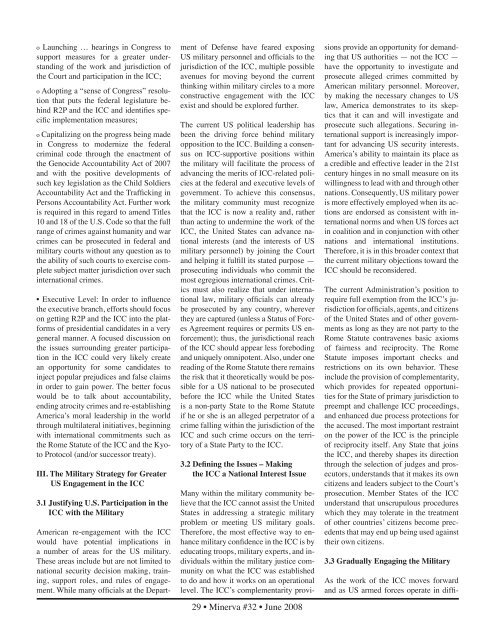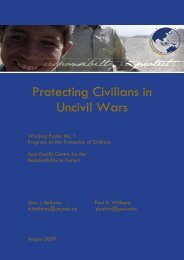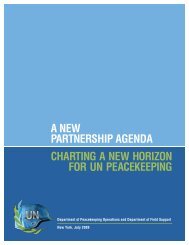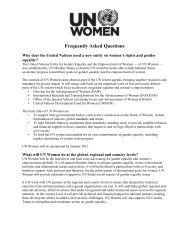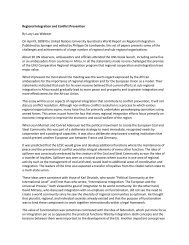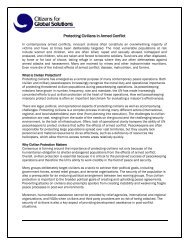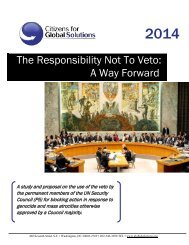Minerva, Spring 2008 (Volume 32) - Citizens for Global Solutions
Minerva, Spring 2008 (Volume 32) - Citizens for Global Solutions
Minerva, Spring 2008 (Volume 32) - Citizens for Global Solutions
You also want an ePaper? Increase the reach of your titles
YUMPU automatically turns print PDFs into web optimized ePapers that Google loves.
o Launching … hearings in Congress to<br />
support measures <strong>for</strong> a greater understanding<br />
of the work and jurisdiction of<br />
the Court and participation in the ICC;<br />
o Adopting a “sense of Congress” resolution<br />
that puts the federal legislature behind<br />
R2P and the ICC and identifies specific<br />
implementation measures;<br />
o Capitalizing on the progress being made<br />
in Congress to modernize the federal<br />
criminal code through the enactment of<br />
the Genocide Accountability Act of 2007<br />
and with the positive developments of<br />
such key legislation as the Child Soldiers<br />
Accountability Act and the Trafficking in<br />
Persons Accountability Act. Further work<br />
is required in this regard to amend Titles<br />
10 and 18 of the U.S. Code so that the full<br />
range of crimes against humanity and war<br />
crimes can be prosecuted in federal and<br />
military courts without any question as to<br />
the ability of such courts to exercise complete<br />
subject matter jurisdiction over such<br />
international crimes.<br />
• Executive Level: In order to influence<br />
the executive branch, ef<strong>for</strong>ts should focus<br />
on getting R2P and the ICC into the plat<strong>for</strong>ms<br />
of presidential candidates in a very<br />
general manner. A focused discussion on<br />
the issues surrounding greater participation<br />
in the ICC could very likely create<br />
an opportunity <strong>for</strong> some candidates to<br />
inject popular prejudices and false claims<br />
in order to gain power. The better focus<br />
would be to talk about accountability,<br />
ending atrocity crimes and re-establishing<br />
America’s moral leadership in the world<br />
through multilateral initiatives, beginning<br />
with international commitments such as<br />
the Rome Statute of the ICC and the Kyoto<br />
Protocol (and/or successor treaty).<br />
III. The Military Strategy <strong>for</strong> Greater<br />
US Engagement in the ICC<br />
3.1 Justifying U.S. Participation in the<br />
ICC with the Military<br />
American re-engagement with the ICC<br />
would have potential implications in<br />
a number of areas <strong>for</strong> the US military.<br />
These areas include but are not limited to<br />
national security decision making, training,<br />
support roles, and rules of engagement.<br />
While many officials at the Department<br />
of Defense have feared exposing<br />
US military personnel and officials to the<br />
jurisdiction of the ICC, multiple possible<br />
avenues <strong>for</strong> moving beyond the current<br />
thinking within military circles to a more<br />
constructive engagement with the ICC<br />
exist and should be explored further.<br />
The current US political leadership has<br />
been the driving <strong>for</strong>ce behind military<br />
opposition to the ICC. Building a consensus<br />
on ICC-supportive positions within<br />
the military will facilitate the process of<br />
advancing the merits of ICC-related policies<br />
at the federal and executive levels of<br />
government. To achieve this consensus,<br />
the military community must recognize<br />
that the ICC is now a reality and, rather<br />
than acting to undermine the work of the<br />
ICC, the United States can advance national<br />
interests (and the interests of US<br />
military personnel) by joining the Court<br />
and helping it fulfill its stated purpose —<br />
prosecuting individuals who commit the<br />
most egregious international crimes. Critics<br />
must also realize that under international<br />
law, military officials can already<br />
be prosecuted by any country, wherever<br />
they are captured (unless a Status of Forces<br />
Agreement requires or permits US en<strong>for</strong>cement);<br />
thus, the jurisdictional reach<br />
of the ICC should appear less <strong>for</strong>eboding<br />
and uniquely omnipotent. Also, under one<br />
reading of the Rome Statute there remains<br />
the risk that it theoretically would be possible<br />
<strong>for</strong> a US national to be prosecuted<br />
be<strong>for</strong>e the ICC while the United States<br />
is a non-party State to the Rome Statute<br />
if he or she is an alleged perpetrator of a<br />
crime falling within the jurisdiction of the<br />
ICC and such crime occurs on the territory<br />
of a State Party to the ICC.<br />
3.2 Defining the Issues – Making<br />
the ICC a National Interest Issue<br />
29 • <strong>Minerva</strong> #<strong>32</strong> • June <strong>2008</strong><br />
Many within the military community believe<br />
that the ICC cannot assist the United<br />
States in addressing a strategic military<br />
problem or meeting US military goals.<br />
There<strong>for</strong>e, the most effective way to enhance<br />
military confidence in the ICC is by<br />
educating troops, military experts, and individuals<br />
within the military justice community<br />
on what the ICC was established<br />
to do and how it works on an operational<br />
level. The ICC’s complementarity provisions<br />
provide an opportunity <strong>for</strong> demanding<br />
that US authorities — not the ICC —<br />
have the opportunity to investigate and<br />
prosecute alleged crimes committed by<br />
American military personnel. Moreover,<br />
by making the necessary changes to US<br />
law, America demonstrates to its skeptics<br />
that it can and will investigate and<br />
prosecute such allegations. Securing international<br />
support is increasingly important<br />
<strong>for</strong> advancing US security interests.<br />
America’s ability to maintain its place as<br />
a credible and effective leader in the 21st<br />
century hinges in no small measure on its<br />
willingness to lead with and through other<br />
nations. Consequently, US military power<br />
is more effectively employed when its actions<br />
are endorsed as consistent with international<br />
norms and when US <strong>for</strong>ces act<br />
in coalition and in conjunction with other<br />
nations and international institutions.<br />
There<strong>for</strong>e, it is in this broader context that<br />
the current military objections toward the<br />
ICC should be reconsidered.<br />
The current Administration’s position to<br />
require full exemption from the ICC’s jurisdiction<br />
<strong>for</strong> officials, agents, and citizens<br />
of the United States and of other governments<br />
as long as they are not party to the<br />
Rome Statute contravenes basic axioms<br />
of fairness and reciprocity. The Rome<br />
Statute imposes important checks and<br />
restrictions on its own behavior. These<br />
include the provision of complementarity,<br />
which provides <strong>for</strong> repeated opportunities<br />
<strong>for</strong> the State of primary jurisdiction to<br />
preempt and challenge ICC proceedings,<br />
and enhanced due process protections <strong>for</strong><br />
the accused. The most important restraint<br />
on the power of the ICC is the principle<br />
of reciprocity itself. Any State that joins<br />
the ICC, and thereby shapes its direction<br />
through the selection of judges and prosecutors,<br />
understands that it makes its own<br />
citizens and leaders subject to the Court’s<br />
prosecution. Member States of the ICC<br />
understand that unscrupulous procedures<br />
which they may tolerate in the treatment<br />
of other countries’ citizens become precedents<br />
that may end up being used against<br />
their own citizens.<br />
3.3 Gradually Engaging the Military<br />
As the work of the ICC moves <strong>for</strong>ward<br />
and as US armed <strong>for</strong>ces operate in diffi-


